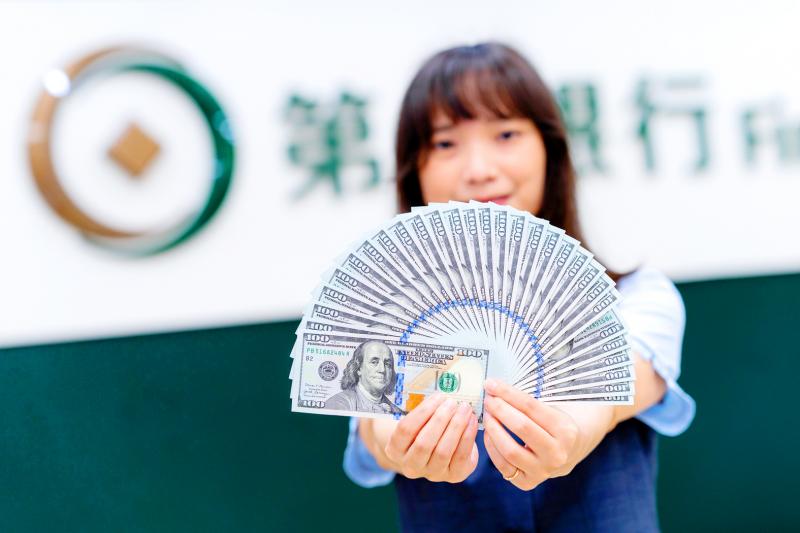The New Taiwan dollar yesterday slid past a key psychological level of NT$30 per US dollar in the morning session for the first time since June 2020, as a double whammy of heightened geopolitical risks and weaker economic growth weigh on the currency.
The currency fell as much as 0.2 percent to NT$30.008 per US dollar. That is because sentiment turned cautious amid US House Speaker Nancy Pelosi’s potential visit to Taiwan and as data showed manufacturing activity was the weakest since May 2020.
“There may be some political risk priced into the Taiwan dollar due to Pelosi’s visit to Asia,” said Khoon Goh (吳昆), head of Asia research at Australia & New Zealand Banking Group.

Photo: Chen Mei-ying, Taipei Times
“This is the main reason why the Taiwan dollar has underperformed in the region despite the greenback being weaker,” he said, adding that the surprise drop in Taiwan’s purchasing managers’ index further into contraction territory also probably weighed on the currency.
The NT dollar retraced some of its early loss to close at NT$29.98 per US dollar in Taipei trading yesterday.
However, the downside risk for the currency is high as indicated by its one-month implied volatility, which has risen in the past four sessions from a five-month low touched last week.
Pelosi left Taiwan out of the itinerary in a statement on Sunday announcing the trip, which is to also include stops in Japan, South Korea and Malaysia. Yet speculation is still rife that Pelosi would visit Taiwan at some point this week, risking a heavy-handed response from China.
“The underperformance in the Taiwan dollar is reflecting heightened geopolitical risk, rather than fundamentals,” Frances Cheung (張淑嫻), rates strategist at Oversea-Chinese Banking Corp in Singapore. “Unfortunately this kind of sentiment appears to be self-fulfilling in that the resulting equity outflows are putting pressure on the local currency.”
ING Bank NV has a bearish outlook on the NT dollar based on fundamentals and weak demand for semiconductors.
“That’s driven mainly from weak demand for smart devices due to lower purchasing power in China and high inflation in US and Europe,” ING chief China economist Iris Pang (彭藹嬈) said.

Real estate agent and property developer JSL Construction & Development Co (愛山林) led the average compensation rankings among companies listed on the Taiwan Stock Exchange (TWSE) last year, while contract chipmaker Taiwan Semiconductor Manufacturing Co (TSMC, 台積電) finished 14th. JSL Construction paid its employees total average compensation of NT$4.78 million (US$159,701), down 13.5 percent from a year earlier, but still ahead of the most profitable listed tech giants, including TSMC, TWSE data showed. Last year, the average compensation (which includes salary, overtime, bonuses and allowances) paid by TSMC rose 21.6 percent to reach about NT$3.33 million, lifting its ranking by 10 notches

SEASONAL WEAKNESS: The combined revenue of the top 10 foundries fell 5.4%, but rush orders and China’s subsidies partially offset slowing demand Taiwan Semiconductor Manufacturing Co (TSMC, 台積電) further solidified its dominance in the global wafer foundry business in the first quarter of this year, remaining far ahead of its closest rival, Samsung Electronics Co, TrendForce Corp (集邦科技) said yesterday. TSMC posted US$25.52 billion in sales in the January-to-March period, down 5 percent from the previous quarter, but its market share rose from 67.1 percent the previous quarter to 67.6 percent, TrendForce said in a report. While smartphone-related wafer shipments declined in the first quarter due to seasonal factors, solid demand for artificial intelligence (AI) and high-performance computing (HPC) devices and urgent TV-related orders

Prices of gasoline and diesel products at domestic fuel stations are this week to rise NT$0.2 and NT$0.3 per liter respectively, after international crude oil prices increased last week, CPC Corp, Taiwan (台灣中油) and Formosa Petrochemical Corp (台塑石化) said yesterday. International crude oil prices last week snapped a two-week losing streak as the geopolitical situation between Russia and Ukraine turned increasingly tense, CPC said in a statement. News that some oil production facilities in Alberta, Canada, were shut down due to wildfires and that US-Iran nuclear talks made no progress also helped push oil prices to a significant weekly gain, Formosa said

MINERAL DIPLOMACY: The Chinese commerce ministry said it approved applications for the export of rare earths in a move that could help ease US-China trade tensions Chinese Vice Premier He Lifeng (何立峰) is today to meet a US delegation for talks in the UK, Beijing announced on Saturday amid a fragile truce in the trade dispute between the two powers. He is to visit the UK from yesterday to Friday at the invitation of the British government, the Chinese Ministry of Foreign Affairs said in a statement. He and US representatives are to cochair the first meeting of the US-China economic and trade consultation mechanism, it said. US President Donald Trump on Friday announced that a new round of trade talks with China would start in London beginning today,